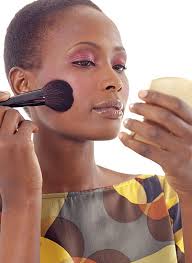SKIN CARE PRODUCTS



Skin whitening is a prime objective of skincare for many women, with hyper
pigmentation due to sun damage or hormones now considered as much of an
aging factor as wrinkling. Many cosmetics companies claim that their products
provide skin whitening or brightening, but there are only a few active ingredients
that really are able to fade skin discolorations. The most effective ingredients for
skin whitening are hydroquinone, kojic acid, arbutin, and vitamin C. Avoid
treatments that contain mercury, because though it’s effective, it’s highly toxic.
SKIN WHITENING PRODUCTS




Hydroquinone is the most common skin whitening ingredient used in the
U.S. It is available in concentrations of up to 2% in over-the-counter products,
and stronger solutions (up to 4%) can be prescribed by a dermatologist.
However, hydroquinone is banned in Europe and parts of Asia and Africa due to
fear of a cancer risk. Hydroquinone works by inhibiting melanin production and
is very effective after 4 weeks of continuous treatment; using hydroquinone
products for longer than 3 months is not recommended, however, because
overuse can actually cause darkening of the skin.
Kojic acid also inhibits melanin production. Derived from a fungus, it is a
more natural skin whitening alternative to hydroquinone. Kojic acid is more
effective when combined with glycolic acid, and can be extremely irritating
to sensitive skin, so try a small test patch first. People using kojic acid products
will usually see results within 8 weeks. Many Japanese skin whitening
products use kojic acid as the active ingredient. Recent studies have also
called kojic acid’s safety into question, however.
Arbutin is a relatively new skin whitening ingredient that is made from
bearberry extract. Since it also has soothing properties, it’s an excellent
choice for people with sensitive skin. However, it hasn’t been tested as
extensively as the other skin whitening treatments, so its efficacy is as yet
unproven.
Vitamin C can also be effective at inhibiting melanin production. However,
the tests that show it to be effective have used a concentration of over 5%,
which is much more than what is usually used in cosmetic products. Vitamin
C is also notoriously unstable, which means that by the time a cosmetic
roduct containing it gets home to you it may have broken down and become
useless. For this reason, Vitamin C is a last resort skin whitening treatment
for those who can’t use the other topical treatments for one reason or another.
For those for whom topical skin whitening treatments don’t work, laser
resurfacing or visible pulsed light treatments, available from a dermatologist’s
office, may do the trick. These treatments, which need to be repeated periodically
to be effective, cost from $3,000-$5,000 for a set of four treatments. Laser
resurfacing and visible pulsed light are not recommended for people with dark
skin, as they can leave disfiguring scars.
Whichever active skin whitening treatment you choose, make sure to use
sunscreen with an SPF of at least 15 daily. Using skin whitening treatments
without sunscreen actually accelerates sun damage and makes it worse.





No comments:
Post a Comment